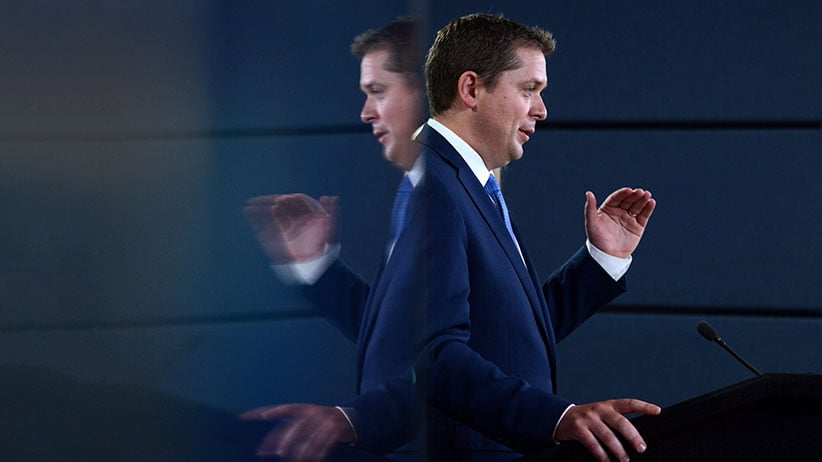Andrew Scheer walks a tightrope as he builds his shadow cabinet
Kellie Leitch and Brad Trost are shut out, Maxime Bernier is denied the finance portfolio—and just maybe, the world is unfolding as it should
Leader of the Official Opposition and Leader of the Conservative Party of Canada, Andrew Scheer, makes an announcement and holds a media availability at the National Press Theatre in Ottawa on Thursday, July 20, 2017. (Sean Kilpatrick/CP)
Share

Andrew Scheer’s selling proposition as leader of the Conservative Party seems to be that he can calm two groups of people who disliked Stephen Harper.
On one hand, there are swing voters who might have voted Conservative once or more in 2004, 2006, 2008 or 2011, but who had decided by 2015 that Harper was too angry, reclusive, or otherwise unacceptable as Conservative leader. These are the voters who, theoretically, could be recaptured if the Conservatives were to more diligently police their “tone.” People who will never vote Conservative surely don’t believe tone is enough, but believe me, the Harper Conservatives really used to work hard on tone, back when they were winning.
The other component of the expanded Scheer coalition is… not the same as the skittish “tone” voters. That’s the dyed-in-the-wool Conservative activists who found Harper disappointing because he too often seemed to be reining them in, holding them back, telling them to be less libertarian, less hawkish, less socially conservative than they wanted to be. For the sake of the broader coalition, you understand. This was the famous Harper incrementalism, about which a guy could write a whole book, theoretically. But to many conservative Conservatives, it chafed.
READ: Andrew Scheer, the Conservative Party’s folksy unifier
I guess Scheer expects he can woo both groups because he’s a complex guy: more good-humoured than Harper, but also more willing to let conservatives be conservative. The “shadow cabinet” the new Conservative leader released on Wednesday begins to put some meat on the bones of that offer. It suggests Scheer has begun to grapple with the complexity and difficulty of his job.
The big surprises:
• Maxime Bernier, who was ahead of Scheer on 12 of 13 ballots in May’s leadership election, is not the finance critic as he wanted to be.
• Pierre Poilievre, who rubs a lot of people the wrong way, is the finance critic.
• Two of Scheer’s leadership rivals, the identity-politics-obsessed Kellie Leitch and the Christian conservative standard-bearer Brad Trost, don’t have any critic assignment at all. Neither does Gerry Ritz, who was Harper’s agriculture minister for most of a decade.
Many of these choices are easy to explain. Some of the critic assignments are pretty smart. (I think people will notice Marilyn Gladu, the MP for my hometown of Sarnia, who becomes health critic where she’ll build on her growing reputation as a personable and diligent MP. And appointing Peter Kent as “shadow minister for ethics” may turn out to have been a masterstroke. Kent is so far proving much better cut out for opposition than he was for government.) Taken together, however, they suggest some of the pitfalls of attempting to appeal to both moderate voters and highly motivated partisans.
The demotions for Trost and Leitch will please Canadians who thought the Conservatives were drifting into right-wing, nativist territory. But between them, the two had 15% of Conservatives’ support on the first ballot of the leadership vote.
Maybe Scheer’s assumption is that Michelle Rempel, who remains the party’s immigration critic, can keep the party current among voters who worry about the influx of asylum-seekers, with less of Leitch’s awesome tone deafness. But 15% of the party is a lot of people to disappoint by snubbing their champions.
And for what? Putting Poilievre in Finance endangers a lot of the goodwill Scheer might have hoped to gain by ditching Trost and Leitch. I’m not going to lie to you, I’m fond of Poilievre, who’s way more thoughtful, erudite and well-read than his pointing-and-blaming Commons persona might indicate. But that persona has turned off a lot of voters, and if Poilievre wants to reinvent himself, it’ll take time to execute the pivot.
On to Bernier. Scheer owes him more than most recent party leaders have owed any rival. But it’s not clear how he could have satisfied Bernier. Making the hale Beauce MP finance critic was out of the question. The two men simply disagree on too much. Bernier’s against supply management; could he credibly defend it for a leader who supports it? Similar questions could be asked on taxation, on funding the CBC, and more. It would be way too easy for the Liberals to drive wedges between the two.
But on Twitter, where admittedly people go to grumble, there’s already grumbling among Bernier supporters who think their man has been snubbed.
Being a persuasive opposition leader isn’t the work of a day, it’s the work of months, and there’s every reason to suspect Scheer’s “shadow cabinet” will have days when it’s successful at boxing the Trudeau Liberals’ ears back. But it’s easy to imagine yourself as both nicer and more audacious than your predecessor; harder to deliver.
MORE ABOUT THE CONSERVATIVE PARTY OF CANADA:
- A beer with Andrew Scheer: Tories’ leader, popcorn addict… feminist?
- The Tory MP who made his peace with Pride Week
- Rona Ambrose’s advice for Canadian women considering politics
- Why yes, this is Andrew Scheer’s first rodeo
- The Conservatives don’t show up for Pride, and that’s a problem
- Where the Conservatives go from here
- Can Andrew Scheer fix the Conservative Party’s diversity problem?
- An insider’s view of the final week of Andrew Scheer’s campaign